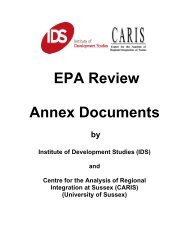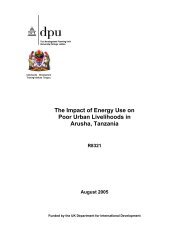Policy Levers in Malaysia - Department of International ...
Policy Levers in Malaysia - Department of International ...
Policy Levers in Malaysia - Department of International ...
You also want an ePaper? Increase the reach of your titles
YUMPU automatically turns print PDFs into web optimized ePapers that Google loves.
CRISE <strong>Policy</strong> Context Paper 4, May 2004<br />
Institutional bias and undemocratic practices virtually ensure the BN re-election at the<br />
federal level. State governments have been less easy for the regime to control, with<br />
three out <strong>of</strong> the thirteen states – Kelantan, Sabah, and Terengganu – hav<strong>in</strong>g fallen <strong>in</strong>to<br />
opposition hands at one time or another. In such cases, however, the federal<br />
government has usually resorted to draconian measures to reel <strong>in</strong> the errant state (e.g.<br />
Barraclough 1985; Brown 2004). The democratic structures are now seen as ensur<strong>in</strong>g a<br />
degree <strong>of</strong> social responsiveness on the part <strong>of</strong> the entrenched regime, but no longer<br />
<strong>of</strong>fer true representation (Crouch 1996).<br />
Among the factors that have been identified as serv<strong>in</strong>g to <strong>in</strong>hibit the democratic process<br />
<strong>in</strong> <strong>Malaysia</strong> are:<br />
• URepressive legislationU. A number <strong>of</strong> powerful and discretionary acts have<br />
imbued the state with wide-rang<strong>in</strong>g repressive capabilities. Most notorious<br />
amongst these is Internal Security Act (ISA), which allow effectively for <strong>in</strong>def<strong>in</strong>ite<br />
detention without trial, with little legal recourse for deta<strong>in</strong>ees. The Police Act<br />
requires permits to be obta<strong>in</strong>ed for all public gather<strong>in</strong>gs – a requirement<br />
str<strong>in</strong>gently enforced for opposition groups, and all but ignored for government<br />
parties. Amendments to the Societies Act and the Official Secrets Act, <strong>in</strong> 1981<br />
and 1986 respectively, fettered even further the arena <strong>of</strong> public debate.<br />
• UConstitutional amendmentsU. With its consistent two-thirds majority, the regime<br />
has amended the constitution to its needs as it sees fit. It has been claimed by<br />
the opposition DAP that the government has amended the constitution over a<br />
thousand times s<strong>in</strong>ce <strong>in</strong>dependence. Indeed, Means (1991: 142) argues that ‘the<br />
Constitution is valued for its capacity to provide the rituals <strong>of</strong> legitimacy, but [its]<br />
constitutional limitations on the government provide little more than a temporary<br />
check on the exercise <strong>of</strong> power’.<br />
• UControl <strong>of</strong> the JudiciaryU. Writ<strong>in</strong>g <strong>in</strong> 1987, the prom<strong>in</strong>ent social activist Chandra<br />
Muzaffar (1989: 147) suggested that the Judiciary was an important force that<br />
‘may help preserve <strong>Malaysia</strong>n democracy’. S<strong>in</strong>ce then, however, the<br />
<strong>in</strong>dependence <strong>of</strong> the Judiciary has been greatly reduced, br<strong>in</strong>g<strong>in</strong>g it firmly under<br />
the control <strong>of</strong> the Executive. This has been defended by the regime as<br />
necessary to ensure the democratic accountability <strong>of</strong> the Judiciary (Mahathir<br />
1995). Indeed, Mahathir has even gone so far as to suggest that the Judiciary<br />
needs further reform as judges ‘tend to favour’ the opposition (FEER, 24/6/1999).<br />
Despite Mahathir’s compla<strong>in</strong>ts, however, the judiciary rema<strong>in</strong>ed overwhelm<strong>in</strong>gly<br />
compliant politically throughout the 1990s, as evidenced <strong>in</strong> the various trials <strong>of</strong><br />
Anwar Ibrahim (see Case 2003).<br />
• U‘Money politics’U. Initially under the guise <strong>of</strong> the 1971 promulgated New Economic<br />
<strong>Policy</strong>, the regime has developed a fearsome mach<strong>in</strong>ery for dispens<strong>in</strong>g<br />
patronage to supporters <strong>of</strong> the government. This ‘money politics’ <strong>in</strong>volves both<br />
state and private funds – the BN parties control between them a massive<br />
corporate empire – and operates on the <strong>in</strong>dividual, corporate and even state<br />
level. The abuse <strong>of</strong> public funds is <strong>of</strong>ten unabashed. In the run up to the March<br />
1999 state elections <strong>in</strong> Sabah, for <strong>in</strong>stance, it was declared that the federal<br />
government ‘would not be generous [with fund<strong>in</strong>g] if the state was under an<br />
opposition government’ (Star, 11/3/1999). A similar threat was been made <strong>in</strong><br />
relation to Kedah, one <strong>of</strong> the states that PAS had the greatest possibility <strong>of</strong><br />
captur<strong>in</strong>g at the 1999 general election.<br />
5
















